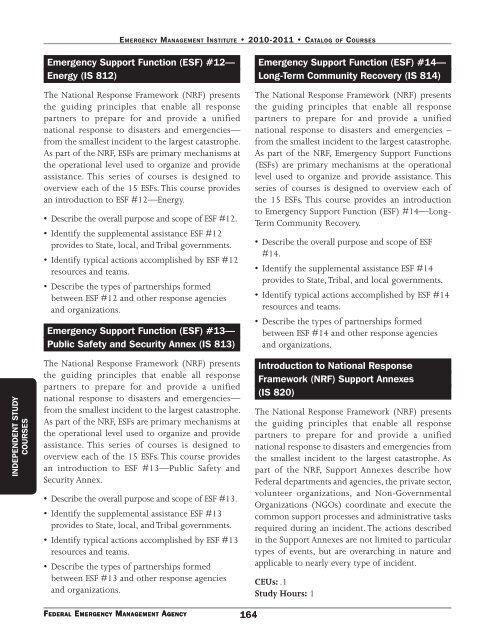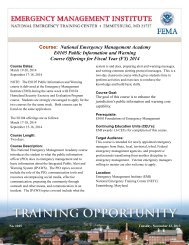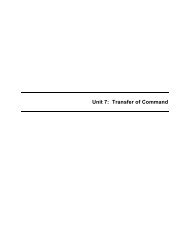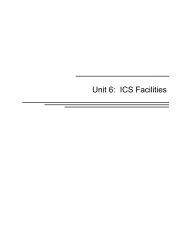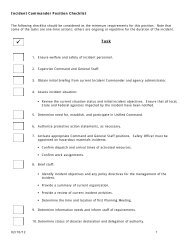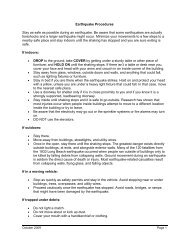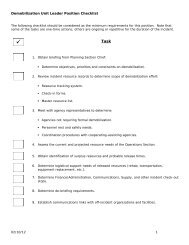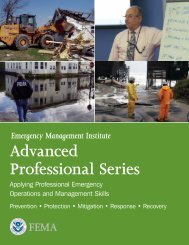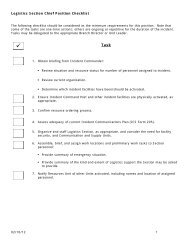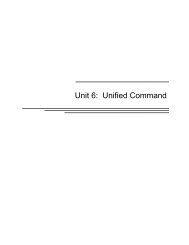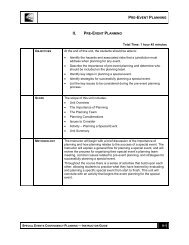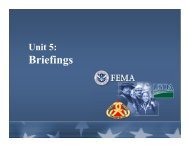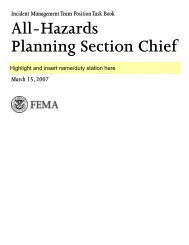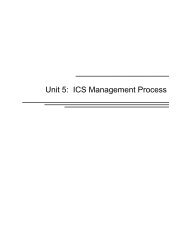enrollment for emi courses - Emergency Management Institute ...
enrollment for emi courses - Emergency Management Institute ...
enrollment for emi courses - Emergency Management Institute ...
You also want an ePaper? Increase the reach of your titles
YUMPU automatically turns print PDFs into web optimized ePapers that Google loves.
InDEpEnDEnt stuDy<br />
cOursEs<br />
EmE r g E n c y ma n a g E m E n t In s t I t u t E • 2010-2011 • ca t a l o g of co u r s E s<br />
<strong>Emergency</strong> support function (Esf) #12—<br />
Energy (Is 812)<br />
The National Response Framework (NRF) presents<br />
the guiding principles that enable all response<br />
partners to prepare <strong>for</strong> and provide a unified<br />
national response to disasters and emergencies—<br />
from the smallest incident to the largest catastrophe.<br />
As part of the NRF, ESFs are primary mechanisms at<br />
the operational level used to organize and provide<br />
assistance. This series of <strong>courses</strong> is designed to<br />
overview each of the 15 ESFs. This course provides<br />
an introduction to ESF #12—Energy.<br />
• Describe the overall purpose and scope of ESF #12.<br />
• Identify the supplemental assistance ESF #12<br />
provides to State, local, and Tribal governments.<br />
• Identify typical actions accomplished by ESF #12<br />
resources and teams.<br />
• Describe the types of partnerships <strong>for</strong>med<br />
between ESF #12 and other response agencies<br />
and organizations.<br />
<strong>Emergency</strong> support function (Esf) #13—<br />
public safety and security annex (Is 813)<br />
The National Response Framework (NRF) presents<br />
the guiding principles that enable all response<br />
partners to prepare <strong>for</strong> and provide a unified<br />
national response to disasters and emergencies—<br />
from the smallest incident to the largest catastrophe.<br />
As part of the NRF, ESFs are primary mechanisms at<br />
the operational level used to organize and provide<br />
assistance. This series of <strong>courses</strong> is designed to<br />
overview each of the 15 ESFs. This course provides<br />
an introduction to ESF #13—Public Safety and<br />
Security Annex.<br />
• Describe the overall purpose and scope of ESF #13.<br />
• Identify the supplemental assistance ESF #13<br />
provides to State, local, and Tribal governments.<br />
• Identify typical actions accomplished by ESF #13<br />
resources and teams.<br />
• Describe the types of partnerships <strong>for</strong>med<br />
between ESF #13 and other response agencies<br />
and organizations.<br />
FEd E r A L Em E r g E N C y mA N A g E m E N T Ag E N C y 164<br />
<strong>Emergency</strong> support function (Esf) #14—<br />
long-term community recovery (Is 814)<br />
The National Response Framework (NRF) presents<br />
the guiding principles that enable all response<br />
partners to prepare <strong>for</strong> and provide a unified<br />
national response to disasters and emergencies –<br />
from the smallest incident to the largest catastrophe.<br />
As part of the NRF, <strong>Emergency</strong> Support Functions<br />
(ESFs) are primary mechanisms at the operational<br />
level used to organize and provide assistance. This<br />
series of <strong>courses</strong> is designed to overview each of<br />
the 15 ESFs. This course provides an introduction<br />
to <strong>Emergency</strong> Support Function (ESF) #14—Long-<br />
Term Community Recovery.<br />
• Describe the overall purpose and scope of ESF<br />
#14.<br />
• Identify the supplemental assistance ESF #14<br />
provides to State, Tribal, and local governments.<br />
• Identify typical actions accomplished by ESF #14<br />
resources and teams.<br />
• Describe the types of partnerships <strong>for</strong>med<br />
between ESF #14 and other response agencies<br />
and organizations.<br />
Introduction to national response<br />
framework (nrf) support annexes<br />
(Is 820)<br />
The National Response Framework (NRF) presents<br />
the guiding principles that enable all response<br />
partners to prepare <strong>for</strong> and provide a unified<br />
national response to disasters and emergencies from<br />
the smallest incident to the largest catastrophe. As<br />
part of the NRF, Support Annexes describe how<br />
Federal departments and agencies, the private sector,<br />
volunteer organizations, and Non-Governmental<br />
Organizations (NGOs) coordinate and execute the<br />
common support processes and administrative tasks<br />
required during an incident. The actions described<br />
in the Support Annexes are not limited to particular<br />
types of events, but are overarching in nature and<br />
applicable to nearly every type of incident.<br />
CEUs: .1<br />
Study Hours: 1


